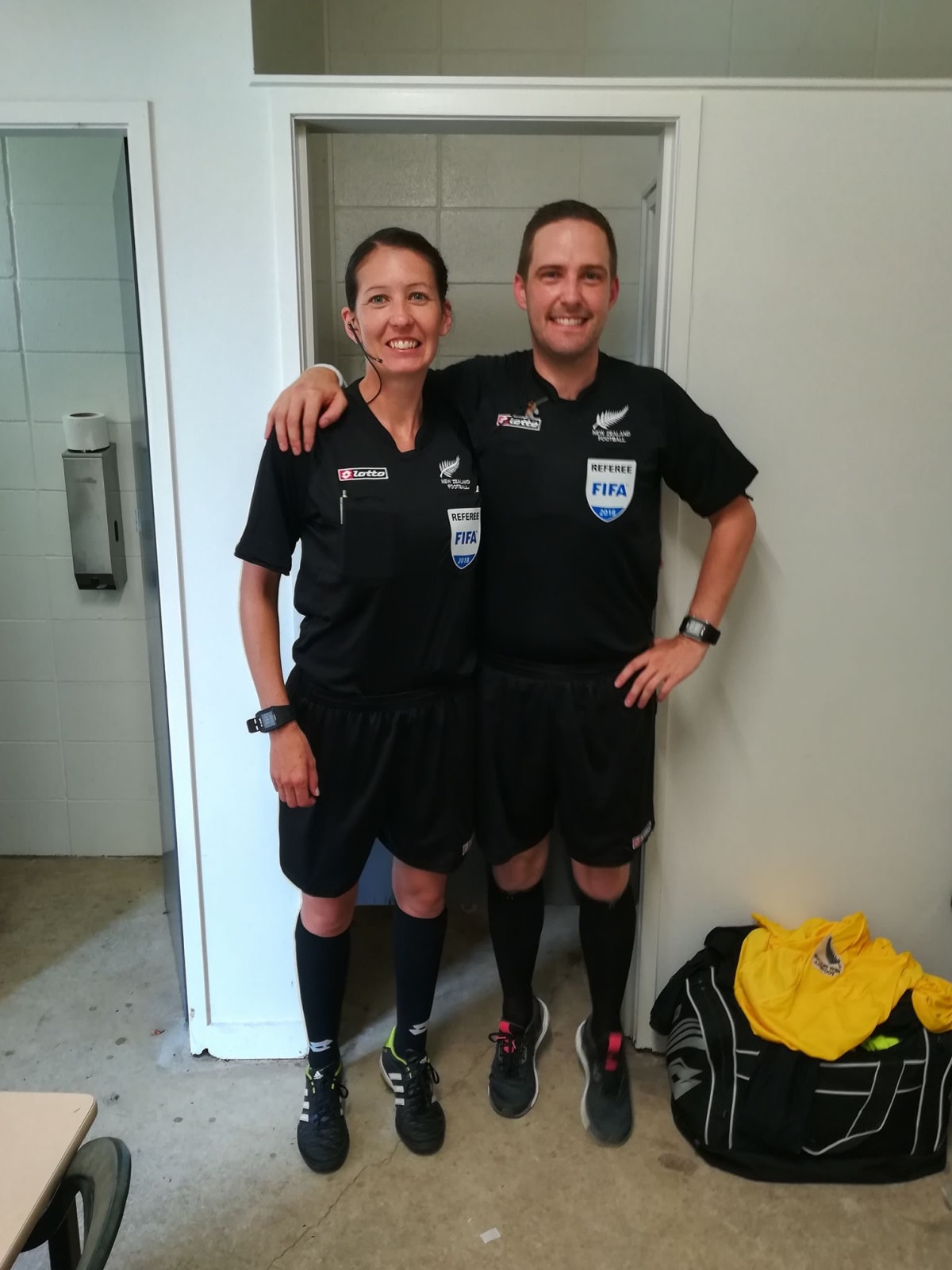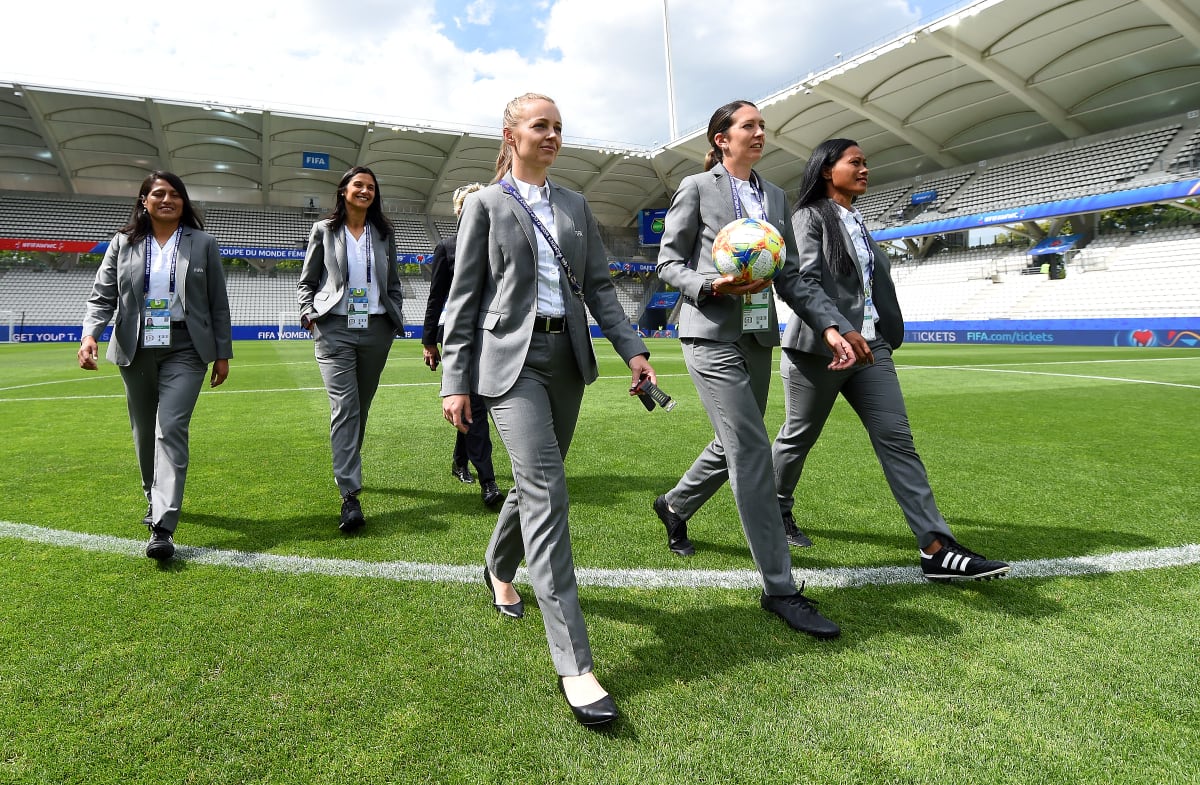
Like the world's best footballers, sole Kiwi match referee Anna-Marie Keighley must be on top of her game to advance through the FIFA Women's World Cup, she tells Suzanne McFadden in our Wāhine of the World Cup series.
Anna-Marie Keighley is happy to be one piece in a big, complex jigsaw puzzle.
The Taranaki mum and high school teacher flies to Sydney today to join the 33rd team to take the field in the FIFA Women’s World Cup – the match officials.
Over the next 10 days, Keighley will be put to the test to determine she’s in peak form to referee at this World Cup, kicking off in under a fortnight.
It’s not a given that Keighley, the sole Kiwi match referee in a team of 33, will get out into the middle for a game at this tournament. Even if she’s officiated at two previous Women’s World Cups and has a wealth of experience, including reffing international men’s football.
She knows she's just one piece in the puzzle, figuring out who holds the whistle in each of the 64 games to be played over a month between New Zealand and Australia.
And if she's chosen, she'll get as little as three days’ notice as to where in Australasia she’ll fly for a game.
READ MORE: * Granddaughter at heart of Women's World Cup legacy * Final juggling act for football's mightiest woman
But like the best footballers in the world, 41-year-old Keighley is used to having to earn her place on the pitch.
“There are some pretty tough decisions to make, especially with the strong referee crew we have,” she says.
“Everyone trains really hard to get those spots in games, and it depends on so many things. How you’re performing, your fitness, the matchups of teams, how the competition is panning out, which teams are looking stronger. And pairing up referees from different confederations so there’s no conflict of interest.
“There’s no surety. You’ve just got to keep working hard. Like a player, you want to still be around at the final stages and be involved in those big matches.”

Keighley’s up against stiff competition, as female refereeing grows with the game.
“We know women’s football has been evolving exponentially in the last four years, since the last World Cup, and the same goes for female referees. There are some phenomenal female referees now,” she says.
“Also across that time, the involvement of women in the men’s game has grown. So now we are referees who are female, not female referees. It’s becoming more normalised for females to be involved at the higher international levels.”
Keighley and assistant referee Sarah Jones made history in Vanuatu in May, becoming the first female referees in a men’s Oceania Champions League finals tournament.
But officiating at a World Cup on your home turf makes this tournament even more exceptional to Keighley and Waikato-based Jones. They’ve worked together as a team since 2015.
And Keighley would love to ref a World Cup game in front of her husband, fellow FIFA referee Campbell-Kirk Kawana-Waugh, and their two-year-old daughter, Miana (who's already a familiar face on sidelines around the South Pacific).
***
For the first time in four years, the full team of 107 officials for this Women’s World Cup come together this weekend for a pre-tournament camp in Sydney - their home base for the next six weeks.
The global pandemic made it difficult to bring them all together, with Keighley and Jones joining part of the team in Qatar last year, to be put through rigorous fitness testing. Now they’ll go through their final preparations for the tournament.
“We all have to work together as a team, flawlessly, so it makes sense to bring everyone together for the final touches,” Keighley says.
“That’s the unique thing with refereeing - you’re in a team with people from all over the world, making friendships and connections. And you’re all there with the same goal - to facilitate a good game. Everyone has to put their best foot forward and hope you get selected for a game.”

Keighley admits every appointment comes with pressure to perform.
“Every goal matters for these teams to pave their way through to the final matches. As an official, that’s part of your thinking as well,” she says.
“You’re going into every game as prepared as you can be, you have the responsibility to make it fair for the players, and to let football be the spectacle. And you keep them safe in the process. There’s that responsibility you have on your shoulders.
“And to a degree, there’s more pressure in your hometown. New Zealand and Australian football is on show to the world.”
Keighley, whose other profession is as a high school PE teacher, has been on extended leave since her daughter was born – knowing 2023 would be an intense football year.
At the past two FIFA Women’s World Cups in 2015 and ‘19, Keighley was teaching full-time as well, fitting in her training around school hours.
“This time the pressure and expectation is even greater, so as a family we made a collective decision that I’d delay going back to full-time work, giving me the opportunity to do the mum thing when I’m around and do my training. Training being the priority, then fitting life in around it,” she says.
“My husband is great. He’s also a ref, so we cross paths from time to time; playing tag team with our daughter.” Though Miana has already accompanied her mum to Australia and Vanuatu when she's been on match duty.
Kawana-Waugh has just returned from Argentina, where he got his “first big break at FIFA level”, as a match referee at the U20 Men’s World Cup. They’ve been training together since he got home, running around a local field with Miana watching from a picnic blanket.

Keighley has been put through her paces by FIFA fitness coaches, who send weekly programmes and fitness tests she must go through. She also has a personal coach in Auckland, Alejo Perz Leguizamon, who’s the FIFA referee fitness instructor for Oceania.
So she knows exactly where she needs to be to keep up with the ever-increasing speed of the women's game.
***
Growing up on a farm behind Mt Messenger, at the northern edge of Taranaki, Keighley didn’t get to play a lot of sport as a kid. “We were too far away,” she says.
“When I went to university in Palmerston North was when I got serious about football. I had always been interested in football, but there wasn’t a girls team at my school [Waitara High]. But at uni there were heaps of teams in comparison,” she says, having played right through her Massey University years.
She has New Zealand Football president and FIFA council member Johanna Wood to thank for inadvertently setting her on the refereeing path - Wood gave Keighley her first teaching job at Queen Elizabeth College in Palmerston North.
As a teacher, Keighley coached school football teams, and was inevitably called on to ref their games.
“I didn’t know all the rules, so I went along to a couple of referee courses and one thing led to another,” Keighley says. “There weren’t many females involved in refereeing, and I got opportunity after opportunity, and then I was on the world stage.
“There were many years of hard work in there as well, of course. You need games under your belt; people talk about the 10,000 hours you need to perfect any type of skills. It’s game after game, training after training.
“I was lucky to get my international badge fairly quickly. But then it took me four years before I got the opportunity to be involved in the Women’s World Cup programme.”
She was then invited to the U17 Women’s World Cup in Costa Rica in 2014, where “they test you out.” She must have passed with flying colours, because she went to her first Women’s World Cup, in Vancouver, the following year.
Keighley had a “dream ride” at that tournament. She and Jones were appointed to five matches – including the round of 16 game between hosts Canada and Switzerland in front of more than 50,000 noisy fans. They then officiated at the semifinal between powerhouses England and Japan (Japan won 2-1).
“I went with no expectations and I got a game, and then another, and another. To go all the way through to a semifinal was awesome,” Keighley says.

Match referees tend to work with the same two assistant referees from their confederation right through a tournament. At this World Cup, Keighley and Jones will have Samoan assistant referee Maria Salamasina in their trio, as they have had since the 2019 tournament.
France 2019 wasn’t such a perfect run, given just two games in the group stages.
“I was released early but I got to stay on and watch the games with my husband, and we finally had our honeymoon after being married for two years,” Keighley says. “It’s wonderful being part of a World Cup, the hype of it all, experiencing different cultures and different people.”
Keighley appreciates being given testing Oceania men’s finals games in the lead-up to this World Cup.
“I know it was the first time having a female match referee in the final stages, but it almost feels normal now to be included,” she says. "It didn’t feel like a groundbreaking, momentous event
“The players treated me the same as the other referees; I was simply a referee. But you’re still flying the flag for other females to become referees, too.”
She’s thrilled to see women’s football evolving at a rapid pace: “The game is faster, more tactical and more physical. It just shows what women are capable of if they’re given the same amount of support and structures around them. It’s very exciting, and it’s going to continue to build at this World Cup.”
By running around in the middle, Keighley hopes she’s inspiring the next generation of young women to take up refereeing. “It’s a unique avenue of sport to get involved in, and I challenge people to give it a go. I’ve developed a lot of skills and capabilities through refereeing – confidence and decision-making,” she says.
“Across officiating in all our codes, we need to encourage people to get involved and create better sideline culture. We need to accept the people in the middle are human – calling it as we see it and doing what we think is right for the game.”
* The Football Ferns play a final warm-up match against Vietnam in Napier on Monday at 5pm, live on Sky Sport 1

.jpg?w=600)





